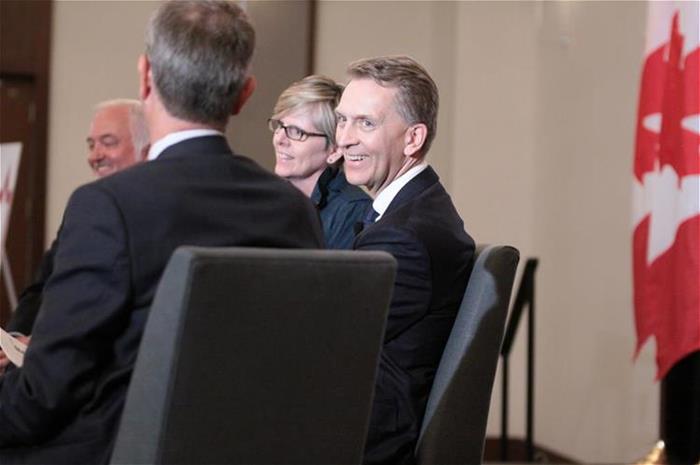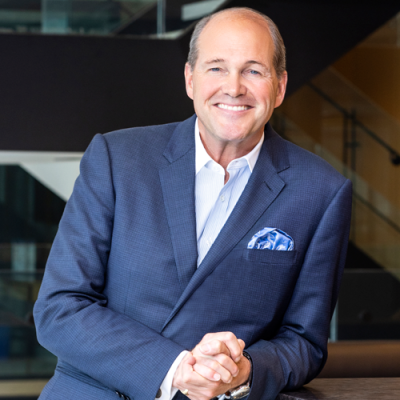Beyond the Podium

Canadian Club Toronto was pleased to welcome Ontario’s CEO Panel for the first event of the 2017/18 season on Thursday, September 21st.
The panel discussed the recently released report from Ontario’s Panel on Economic Growth and Prosperity, entitled “The Future is not destiny: CEO perspectives on realizing Ontario’s potential”. The report was the result of interviews with 33 CEOs and futurists from Ontario, which were conducted to find solutions to the challenges facing Ontario’s businesses and economy, as well as to find out which practices were highlighting Ontario’s strengths.
Three of the futurists interviewed for the report took the Canadian Club Toronto stage. Mary-Ellen Anderson (Vice-President, Developer Experience and Evangelism, Microsoft Canada), Stephen K. Carlisle (President and Managing Director, General Motors Company of Canada), and Bruce Flatt (Chief Executive Officer, Brookfield Asset Management) were introduced by Professor Tiff Macklem (Dean, Rotman School of Management and Chair of the Ontario Panel on Economic Growth) and joined by moderator Kilian Berz (Senior Partner & Managing Director, The Boston Consulting Group).
Professor Tiff Macklem, began by giving a brief summary of the report and its process. The interviews were all “fascinating structured conversations”, he said, that focused more on where Ontario can be in 10-20 years, as opposed to next year. The million dollar question for the interviewees? What can business and governments do to realize Ontario’s potential. All of the CEOs displayed a certain kind of humility about not knowing what’s to come, which inevitably vanished, joked Macklem.
He revealed that common themes materialized very quickly among the interviews. Collectively, there was a “great deal” of optimism about Ontario potential and a general agreement that it was a great place to live and work. The CEOs highlighted that Ontario was blessed with an abundance of natural resources and a diversity of workers and their skillsets. Something that was frequently echoed was the need to find new sources of growth to sustain the standard of living we’ve come to know. Our three greatest advantages overall, Macklem said, are talent access and development, international talent attraction and the level and quality of Ontario research. What’s holding us back? Macklem pointed to our research commercialization capacity, capital commitment to innovation and an aversion to risk taking.
Macklem brought up the hesitation from governments and companies to take on Canadian ventures until they are proved in a US market, something that Mary-Ellen Anderson pointed out later on, is almost never a problem for US ventures. Our startups are great and plentiful but lack the ability to scale up in a global market. To share their insights on Ontario’s path to a successful future, Macklem handed it off to the Kilian Berz, the panel’s moderator.
Berz posed that in 30 years’ time, Ontario could look one of two ways: the first, with a flourishing economy driven off great talent with advanced new sectors. The second, having existing sectors on the decline with the inability to make our mark on the new generation of innovation. We have a lot going for ourselves, he said, but what’s missing from our current narrative and how would that translate into the future?
Bruce Flatt chose the first way, unsurprisingly. He went on to say that Canada is known as an amazing place to do business, with one of the “great unwritten stories” being the Canada Pension Plan. That, along with our financial and advisory systems, are the envy of the world, he said. He gave credit to the tech industry, praising it as “fantastic”. However, he remarked that the stories of our successes, like the Canada Pension Plan (CPP), are not highlighted enough.
Anderson thought that the narrative is completely missed by those outside Canada. In her eyes, we know we are great and innovative, but we need to “do a better job of telling our story, and making sure that the rest of the world knows what Canadians are capable of. Carlisle remarked that he would’ve agreed with Anderson a short time ago, but now is more concerned about the scarcity of certain skillsets in the 21st century as investors come in looking to hire.
“What is the strongest differentiating strength that we have?” asked Berz. “How do we deal with limitations?”
Carlisle applauded our STEM education systems, adding that our grads and schools are consistently at the forefront of the industry. But he wondered if STEM alone was enough to be successful; as in, there is something very human about a lot of the work involved, or at the very least a lot of humans involved in the work. Adding the Arts to STEM, results in STEAM, Carlisle said. Having well-rounded, multifaceted people in these industries contribute to a stronger force.
Anderson then brought up one of the most contentious issues in this conversation globally: How do we get women involved? With something like only 1 in 100 young girls being interested in STEM careers, how do we grow that interest? Berz zeroed in on that concern, adding that getting women involved in the economy would be the biggest driver for growth. What could we be doing to facilitate an environment that encourages the participation of women?
Anderson shared that her company had recently been participating in the blind reading of resumes for new hires. As in, all of the names are removed so that the gender of the person applying isn’t the focus, but rather the skills. We also have to look at the way that we advertise roles, she said. The words we use or the way that we pose a job opportunity can unintentionally define a role as masculine. Advertising roles as ones that respect work/life balance, offer remote opportunities, and promote the ability to learn is a step in the right direction, she said.
Carlisle remarked that there is a critical period around the 8th grade, where young women generally decide if they are interested in going into a STEM field. Making an effort to engage women prior to this time is crucial to ignite a spark for those who may otherwise abandon the idea.
Another hot topics arose next: Canadian aversion to risk taking. This promted Berz to ask if the problem was a mindset or a structural one.
Flatt thought simply that we needed more time. Over the past 25 years, he said, there have been many success stories of Canadians finding their way into the international market. The next 25 will be even better. He denied that people avoid taking risks, and believed our patience would be rewarded. As of now, there’s lots of international interest and a lot of money, but little opportunity, he said.
Anderson said that the risk aversion was a concern of hers. It has improved in the last couple of years with more start-ups being able to stay, she added. She called for Canadians to embrace our solutions as quickly as the US does. Start-ups like Shopify, Hootsuite and Slack were nowhere near perfect when they launched but have now found success by learning the ropes and working toward a better solution.
The final question from Berz: What advice would you give to our political leaders to help us lead into the future?
Flatt said making the environment right for small and large businesses would be beneficial. Anderson stressed the need for embracing cultural diversity, and would ask our political leaders to make acquiring international talent possible. Carlisle finished with “Speed is critical.”
Canadian Club Toronto President Gillian Riley then took the stage to conclude. “Thanks for kick starting our season with such and rich and engaging conversation.” She expressed what an enviable position Ontario is in as the “economic engine” of Canada, and praised the panel for helping us think about ways to continue this legacy.
It is easy as Canadians to feel, at times, second place as we sit above a great economic power. But with the vision of our talented business leaders and futurists, we are reminded of our successes. Our championing of innovation, growth and diversity make us both an ideal place to call home and an economic powerhouse.
“Future is definitely not a destiny, but it’s in our hands to turn it to gold. So let’s do that.” – Kilian Berz
————————————————————————————————————
If you’d like to know more about Canadian Club Toronto or our upcoming events, find us on Twitter: @CdnClubTO, Instagram: @CdnClubTO or Facebook: Canadian Club Toronto.
Special thanks to Mary-Ellen Anderson, Stephen Carlisle, Bruce Flatt, Tiff Macklem and Kilian Berz for being guests of Canadian Club Toronto. Thanks extended to President Gillian Riley for hosting the event and thanking.
Upcoming Events
Upcoming Events

Event Image List - multi_panelists (showing Featured Image)
Wednesday, April 23, 2025
Natan Obed (Inuit Tapiriit Kanatami), Sean Boyd (Agnico Eagle), Heather Exner Pirot (Macdonald-Laurier Institute) & Jessica Shadian (Arctic360)

Event Image List - featured
Wednesday, April 16, 2025
President and Chief Executive Officer, OMERS
Divider – White
Sign Up
Don’t miss out
Sign up to receive updates on upcoming events and speakers.
Divider – White
Become a Member

Become a Member
Members can enjoy the benefits of access to our archives, advance notice of exclusive events, discounts & more!

![Final_0955[18] Final_0955[18]](https://www.canadianclub.org/wp-content/uploads/elementor/thumbs/Final_095518-e1742392222835-r33c3qvbnb2y1kmgek3xc11ydz5nksyb77ndddolgg.jpg)
